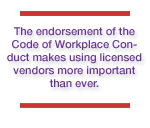It's a chilly day and you forgot your coat, so you stop at the Bookstore to buy a new fleece pullover with the Carnegie Mellon wordmark. You're not thinking about where it came from or who made it. All you know is that it's warm and it makes you feel good.
What you don't realize — how that garment was manufactured — should also make you feel good. Companies that produce goods bearing Carnegie Mellon's name, trademarks or images must go through a lengthy process to be officially licensed by the university. As part of this process, the company must adhere to the Code of Workplace Conduct, developed by the Taskforce on Anti-Sweatshop Labor and endorsed by the President's Council as a best business practice earlier this year.

The code states that Carnegie Mellon condemns the use of sweatshop labor in
the manufacturing of any product that bears its trademarks, and establishes minimum standards for its licensees to follow in their production facilities.
After benchmarking more than 480 colleges and universities, the taskforce created a code that outlines standards for labor policies, basic human rights, workplace safety and environmental health, environmental accountability, wages and hours. The code also contains a special section on human rights for women, who form the majority of the garment industry.
Assistant Vice President of Business Services Neal Binstock said there are several reasons why The Code of Workplace Conduct was developed.
"First, it's the right thing to do," Binstock said. "Carnegie Mellon's responsibilities extend beyond the borders of our campus and we must conduct our business in a socially responsible manner." He also said that the code demonstrates that the university supports the rights and privileges of workers domestically and globally.
To enforce the Code of Workplace Conduct, Carnegie Mellon has become officially affiliated with both the Fair Labor Association (FLA) and the Workers Rights Consortium (WRC), organizations that monitor the actions of factories around the world. Both organizations require licensees to disclose all factory locations so inspections can be made and factory conditions improved if necessary. There are more than 700 factory locations worldwide producing goods bearing the Carnegie Mellon name or trademarks.
Binstock and John "Jay" Marano, licensing coordinator at Carnegie Mellon, said the endorsement of the Code of Workplace Conduct makes using licensed vendors more important than ever.
"The only way it can be successful is if people use our licensed suppliers,"
Marano said.
"When someone in the university community uses a vendor that is not licensed, there is no guarantee that that vendor is not employing sweatshop labor in its facilities. Plus, they are violating official trademark usage policy."
The trademark usage policy states that university trademarks cannot be used in
a manner that would discriminate against any persons or groups or endorse any outside organizations. The Trademark Licensing Office must give written prior approval for the production of all items bearing the Carnegie Mellon name or trademarks, and the campus community must use licensed vendors to manufacture these items. For more on the official trademark policy, see www.cmu.edu/policies/documents/Trademark.html.
"We're trying to educate the university community about why it is important to use licensed vendors," Binstock said. "By educating our community, we expect that more and more people will understand the importance of using licensed vendors and as a result we should experience more compliance."
The Trademark Licensing Office is also working with the student organization People for Workers Rights (PWR) to educate student organizations and staff members on the importance of using licensed vendors.
For more information about the Code of Workplace Conduct, the licensing process and a list of approved vendors, visit the Trademark Licensing Office's Web site
at http://bizservweb.pc.cc.cmu.edu/licensing/index.html
Susan Cribbs
(10/10/02)